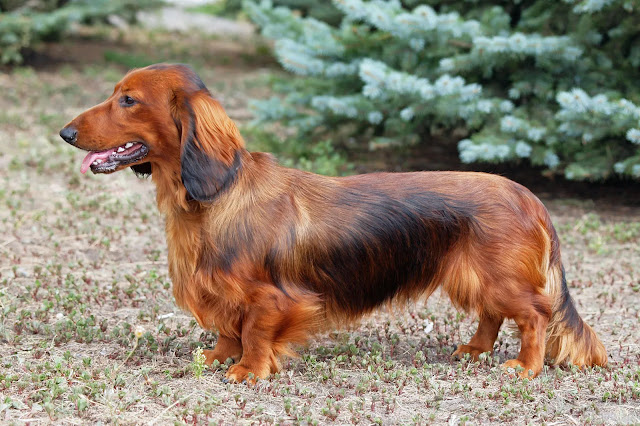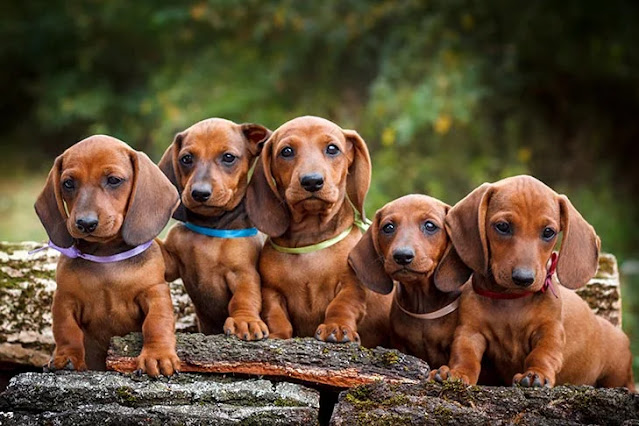Discovering the Charm of Dachshunds: A Comprehensive Guide
Introduction to Dachshunds
Dachshunds,
often affectionately known as "wiener dogs" or "sausage
dogs," are beloved for their unique charm and personality. Originating from Germany, these small hounds
have garnered increasing popularity worldwide. Dachshunds come in various
sizes, including standard, miniature, and tweenie, making them adaptable to
different living environments. Known for their elongated bodies and short legs,
Dachshunds possess a spirited temperament and unwavering loyalty, making them
ideal companions for families. Let's delve into the fascinating world of
Dachshunds and uncover what makes them such beloved pets.
The
Dachshund's Origin Story
The history of Dachshunds traces back to 15th century Germany, where they were bred for hunting badgers due to their elongated bodies, which allowed them to dig into burrows. Over time, these courageous hunters evolved into cherished family pets, renowned for their affectionate nature and distinctive appearance. The miniaturization of Dachshunds occurred in the 19th century, aiming to create smaller companions suitable for urban living. Today, Dachshunds continue to captivate hearts worldwide with their rich history and endearing personalities.
Physical
Characteristics of Dachshunds
Dachshunds
exhibit a range of physical characteristics, including various coat types,
colors, and sizes. Their coats can be
smooth, long-haired, or wire-haired, each requiring specific grooming needs.
Dachshunds also come in different colors, such as red, black and tan, and
dapple. Size variations include
standard, miniature, and tweenie, with each size possessing its own unique
charm and personality. Their distinctive features, including their elongated
bodies and short legs, contribute to their iconic appearance and agile nature.
Dachshund
Physical Characteristics Table
|
Characteristic |
Description |
|
Coat Type |
Smooth, long-haired, wire-haired |
|
Coat Colors |
Red, black and tan, dapple, and more |
|
Size Variations |
Standard, miniature, tweenie |
|
Distinctive Features |
Elongated body, short legs, keen expression |
Understanding
the Dachshund's Temperament
Dachshunds
are renowned for their lively and curious temperament. They are intelligent dogs with a strong
independent streak, often displaying courage and determination. While they can
be affectionate and loyal companions, they may also exhibit stubborn tendencies
at times. Proper socialization and
training from an early age are essential to channel their energy and prevent
behavioral issues. Dachshunds thrive in loving and attentive households,
forming strong bonds with their families and proving to be devoted companions.
Dachshund
Temperament Assessment Table
|
Trait |
Description |
|
Intelligence |
High, known for problem-solving abilities |
|
Loyalty |
Strong bonds with family members |
|
Independence |
Can display stubborn tendencies |
|
Playfulness |
Lively and curious nature |
While
Dachshunds are generally healthy dogs, they are prone to certain health issues,
including intervertebral disc disease (IVDD), which affects their spinal discs
due to their elongated bodies. Regular
veterinary check-ups and preventive care are crucial for detecting and
addressing any health concerns early on. Proper nutrition, regular exercise,
and weight management play significant roles in promoting their longevity and
well-being. Owners should also be aware
of the signs of potential health problems and seek prompt veterinary attention
when necessary.
Dachshund
Health Overview Table
|
Health Consideration |
Description |
|
Common Health Issues |
IVDD, obesity, dental problems, ear
infections |
|
Lifespan Influences |
Proper nutrition, regular exercise,
preventive care |
|
Preventative Healthcare |
Regular vet check-ups,
vaccinations, dental care |
Dachshunds
have specific grooming needs based on their coat type. Smooth-coated Dachshunds
require minimal grooming, while long-haired and wire-haired varieties need more
frequent brushing and grooming to prevent matting and tangles. Proper dental
care, nail trimming, and ear cleaning are essential parts of their grooming
routine. Providing a balanced diet tailored to their nutritional needs is
crucial for their overall health and well-being. Regular veterinary visits help
monitor their health and address any grooming or care concerns.
Dachshund
Grooming Essentials Table
|
Grooming Aspect |
Description |
|
Coat Care |
Brushing, bathing, grooming frequency |
|
Nutrition and Diet |
Balanced diet tailored to nutritional needs |
|
Routine Care |
Dental hygiene, nail trimming, ear cleaning |
Dachshunds
make wonderful family pets, bringing joy and companionship to households of all
sizes. They are affectionate and playful, often forming strong bonds with
family members, including children and other pets. Proper socialization from an
early age helps ensure that they get along well with everyone in the family. However,
it's essential to supervise interactions between Dachshunds and young children
due to their small size and delicate build.
Family
Compatibility Rating Table
|
Aspect |
Rating |
|
Suitability as Family Pets |
Excellent |
|
Interactions with Children |
Supervision |
|
Interactions with Children |
Supervision |
Differences
Between Male and Female Dachshunds
Male and
female Dachshunds may exhibit subtle differences in behavior and temperament.
While both genders can be equally affectionate and loyal, males may display
more dominant behaviors, especially around other dogs. Females, on the other
hand, maybe more nurturing and attentive, particularly during pregnancy and
motherhood. When choosing between a male and female Dachshund, it's essential
to consider individual personalities and how they fit into your family dynamic.
|
Aspect |
Male Dachshunds |
Female Dachshunds |
|
Behavioral Differences |
More dominant tendencies |
Nurturing and attentive |
|
Physical Size |
Typically slightly larger |
Slightly smaller |
|
Health Considerations |
Considerations for neutering |
Considerations for pregnancy |
When
selecting a Dachshund puppy, it's crucial to choose a reputable breeder who
prioritizes the health and well-being of their dogs. Look for breeders who
provide proper documentation, including health records and certifications.
Avoid purchasing puppies from puppy mills or backyard breeders, as they often
prioritize profit over the welfare of the dogs. Take the time to visit the
breeder's facilities, observe the puppies' living conditions, and ask questions
about their breeding practices.
|
Criteria |
Description |
|
Health Documentation |
Vet records, vaccination history, health guarantees |
|
Breeding Practices |
Ethical breeding practices, genetic testing |
|
Facility Conditions |
Clean, well-maintained facilities, socialization
efforts |
Dachshunds
possess several distinctive traits that set them apart from other breeds. Their
elongated bodies and short legs enable them to navigate tight spaces with ease,
making them excellent hunters and companions. Despite their small size,
Dachshunds are courageous and tenacious, traits inherited from their hunting
ancestors. They have a keen sense of smell and a strong prey drive, making them
excellent tracking dogs. Dachshunds also have a playful and curious nature,
always eager to explore their surroundings.
Dachshund
Trait Showcase Table
|
Feature |
Description |
|
Elongated Bodies |
Adaptation for hunting and burrow navigation |
|
Keen Sense of Smell |
Excellent tracking abilities |
|
Playful Nature |
Curious and adventurous temperament |
Owning a
Dachshund comes with its own set of advantages and challenges. On the positive
side, Dachshunds are affectionate, loyal, and adaptable companions, making them
ideal pets for many households. However, they can be prone to certain health
issues, such as IVDD, and may require extra attention to their grooming needs.
Prospective owners should carefully weigh these factors and consider whether a
Dachshund is the right fit for their lifestyle and preferences.
|
Aspect |
Pros |
Cons |
|
Affection |
Loyal and devoted companions |
Prone to health issues like IVDD |
|
Adaptability |
Suited to various living environments |
High grooming needs |
|
Intelligence |
Smart and trainable |
Stubborn tendencies |
Owning a
Dachshund involves various expenses, including initial purchase costs, ongoing
care, and veterinary expenses. While the initial cost of purchasing a Dachshund
can vary depending on factors such as pedigree and coat type, prospective
owners should also budget for regular expenses like food, grooming, and
healthcare. Additionally, unforeseen expenses, such as emergency vet visits or
unexpected medical treatments, should be considered when budgeting for
Dachshund ownership.
Dachshund
Cost Analysis Table
|
Expense |
Estimated Cost (USD) |
|
Purchase Price |
$800 - $2,000 |
|
Annual Food Expenses |
$250 - $500 |
|
Grooming Costs |
$200 - $500 annually |
Dachshunds are exceptional companions known for their unique charm,
loyalty, and spirited personality. Whether you're looking for a playful family
pet or a devoted companion, a Dachshund can bring endless joy and laughter into
your life. With proper care, training, and love, Dachshunds thrive in loving
households and become cherished members of the family. Consider adding a
Dachshund to your family today and experience the unconditional love and
companionship they have to offer.
FAQs on
Dachshunds
FAQ Question | FAQ Answer |
1. What are the different coat types of Dachshunds? | Dachshunds come in three main coat types: smooth,
long-haired, and wire-haired. Each type requires different grooming needs and
maintenance. |
2. Are
Dachshunds good with children and other pets? | Yes, Dachshunds are generally good with children and
other pets when properly socialized from a young age. Supervision is
recommended, especially with small children, due to their delicate build. |
3. How much exercise do Dachshunds need? | Dachshunds require moderate exercise to stay healthy
and mentally stimulated. Daily walks and playtime are essential, but
excessive exercise should be avoided due to their risk of back problems. |
3. Do Dachshunds shed a lot? | Dachshunds are moderate shedders,
with smooth-coated varieties shedding less than long-haired and wire-haired
types. Regular brushing can help minimize shedding and keep their coat
healthy. |
4. Are
Dachshunds easy to train? | Dachshunds are intelligent but can be stubborn,
making training a bit challenging at times. Consistent, positive
reinforcement-based training methods yield the best results with Dachshunds. |
5. What health problems are common in Dachshunds? | Dachshunds are prone to certain health problems,
including intervertebral disc disease (IVDD), obesity, dental issues, and ear
infections. Regular vet check-ups and preventive care are crucial for their
well-being. |
6. How long do Dachshunds live? | On average, Dachshunds have a lifespan of 12 to 16
years, although some can live even longer with proper care and attention to
their health needs. |
7. Are Dachshunds prone to separation anxiety? | Yes, Dachshunds can be prone to separation anxiety
if left alone for extended periods. Early socialization and training can help
prevent or alleviate this behavior. |
8. Do Dachshunds bark a lot? | Dachshunds have a tendency to bark more than some
other breeds, often as a response to perceived threats or boredom. Proper
training can help manage excessive barking behavior. |
9. Are Dachshunds good apartment dogs? | Yes, Dachshunds can make excellent apartment dogs
due to their small size and adaptability. However, they still require regular
exercise and mental stimulation to stay happy and healthy. |
10. How big do Dachshunds get? | Dachshunds come in different sizes, including
standard, miniature, and tweenie. Standard Dachshunds typically weigh between
16 and 32 pounds, while miniature Dachshunds weigh less than 11 pounds. |
11. Do Dachshunds require a lot of grooming? | Grooming needs vary depending on the coat type of
the Dachshund. Smooth-coated Dachshunds require minimal grooming, while
long-haired and wire-haired varieties need more frequent brushing and
grooming to prevent matting and tangles. |
12. Are Dachshunds hypoallergenic? | No, Dachshunds are not considered hypoallergenic.
While they may shed less than some other breeds, they still produce dander
and can trigger allergies in sensitive individuals. |
13. Do Dachshunds like to swim? | Some Dachshunds enjoy swimming, while others may be
hesitant due to their short legs and elongated bodies. It's essential to
introduce them to water gradually and provide supervision, especially in deep
water. |
14. How can I find a reputable Dachshund breeder? | To find a reputable Dachshund breeder, research
local breed clubs, read reviews, and ask for recommendations from trusted
sources. Visit the breeder's facilities, ask about health guarantees, and
ensure they prioritize the well-being of their dogs. |













No comments: